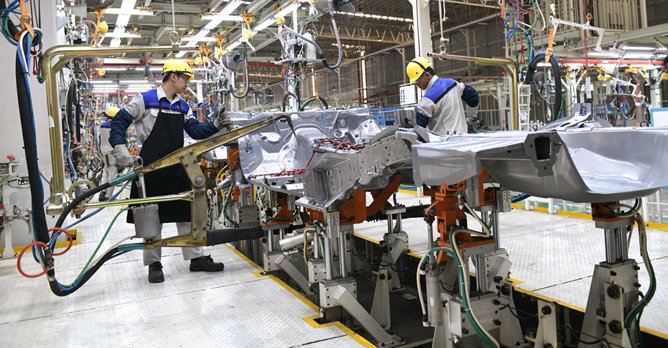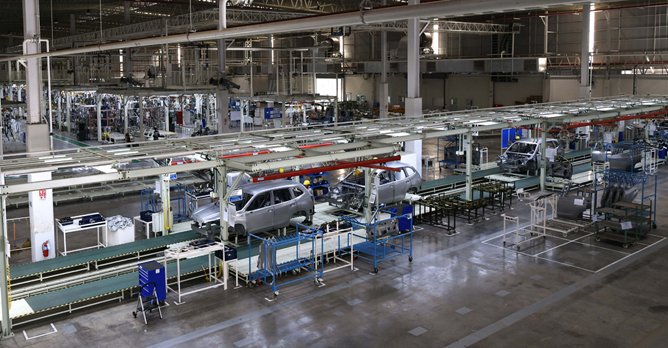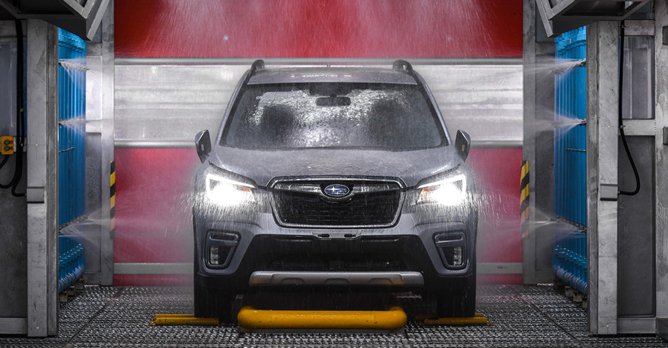An up close and personal experience with Subaru
26 Apr 2019|8,753 views
Stepping out of your comfort zone is a scary thing to do. However, you can only grow if you are willing to feel awkward and uncomfortable when you try something new. You will also reap unique rewards if you do, and that is exactly what Singapore-based, Hong Kong-listed Tan Chong International Limited (TCIL) has just done.
Its new Subaru assembly plant in Bangkok's Ladkrabang Industrial Estate, named Tan Chong Subaru Automotive (Thailand) Limited (TCSAT), a joint venture between TCIL and Japan's Subaru Corporation, signals the company's move from regional vehicle distributor to manufacturer.
The TCSAT plant, which currently assembles Completely Knocked-Down (CKD) Subaru Foresters, occupies more than 100,000m2 in Bangkok's Ladkrabang Industrial Estate.
The project kicked off with an initial investment of $5 billion baht ($212.3 million) and boasts the integration of high-performance robotics, world-class automation and a highly skilled workforce to ensure that all Subaru models leaving the plant are of superior quality and have zero defects.

It starts at a massive warehouse, where parts from Japan as well as local suppliers and stored neatly in shelves. About 57% of the parts (calculated by cost) needed to assemble the Forester are made in Japan, while 43% are made in Thailand.
The Thai-made components include things like the seats, dash panels, infotainment systems and tyres. They are all then brought to the assembly line, where the high-tech robots and dedicated humans work seamlessly together. The combination ensures that the fit and finish equals the Subaru vehicles that come out of Japan.
The key welding points of the body and the sealer application for glass components are also automated to achieve total consistency. This is part of the technology and skills knowledge transfer, which Subaru Corporation has committed to.
More importantly, quality control and correction processes take place during and throughout the assembly process. This is complemented by regular production audits by Subaru Corporation.
Mr. Glenn Tan, Deputy Chairman and Managing Director of TCIL, is also especially proud of the paint shop within the facility. He explains that quality is his top priority, and that automating a large part of the painting line ensures that TCSAT delivers just that. There were no expenses spared especially in this department.
At the painting line, the pre-treatment, electrical deposits, primer and topcoat are applied automatically to ensure evenness and consistency of the paint. One customer even gave feedback that the detailers he sent his new Forester to were incredibly impressed by its paintwork. They even likened it to European models that cost a lot more.
Towards the end of the tour, TCSAT let us check out a finished Forester, and we are happy to report that anyone will be hard-pressed to tell the difference between that and a Japan-assembled model. However, due to Singapore's strict emission standards, we will still get the Jap-made Foresters for now.
The company, however, does not rule out the possibility that the Thai-assembled ones may one day be sold here.
But more than just having a world-class facility, the management at TCSAT are also committed to providing a safe and healthy work environment for its 400-odd staff. A committee oversees the overall safety standards of the plant and proactively identifies and isolates potential risks. Personal protective equipment is required to be worn by all staff and visitors at designated areas.
All management staff are also trained by external consultants on local regulations and global practices. To further promote staff health and well-being, the canteen serves nutritious Thai and Japanese meals, which do actually look incredibly tasty. There are also leisure areas, such as a futsal field, that cater to staff recreation needs.
This may just be the first plant outside Japan to fully produce Subaru cars in Asia but judging from what we've seen, it's a sign of good things to come for TCIL, and its commitment to the Subaru brand. For me, it also proves that taking a leap of faith out of our comfort zone is what we all need to do every once in awhile.
Stepping out of your comfort zone is a scary thing to do. However, you can only grow if you are willing to feel awkward and uncomfortable when you try something new. You will also reap unique rewards if you do, and that is exactly what Singapore-based, Hong Kong-listed Tan Chong International Limited (TCIL) has just done.
Its new Subaru assembly plant in Bangkok's Ladkrabang Industrial Estate, named Tan Chong Subaru Automotive (Thailand) Limited (TCSAT), a joint venture between TCIL and Japan's Subaru Corporation, signals the company's move from regional vehicle distributor to manufacturer.
The TCSAT plant, which currently assembles Completely Knocked-Down (CKD) Subaru Foresters, occupies more than 100,000m2 in Bangkok's Ladkrabang Industrial Estate.
The project kicked off with an initial investment of $5 billion baht ($212.3 million) and boasts the integration of high-performance robotics, world-class automation and a highly skilled workforce to ensure that all Subaru models leaving the plant are of superior quality and have zero defects.

It starts at a massive warehouse, where parts from Japan as well as local suppliers and stored neatly in shelves. About 57% of the parts (calculated by cost) needed to assemble the Forester are made in Japan, while 43% are made in Thailand.
The Thai-made components include things like the seats, dash panels, infotainment systems and tyres. They are all then brought to the assembly line, where the high-tech robots and dedicated humans work seamlessly together. The combination ensures that the fit and finish equals the Subaru vehicles that come out of Japan.
The key welding points of the body and the sealer application for glass components are also automated to achieve total consistency. This is part of the technology and skills knowledge transfer, which Subaru Corporation has committed to.
More importantly, quality control and correction processes take place during and throughout the assembly process. This is complemented by regular production audits by Subaru Corporation.
Mr. Glenn Tan, Deputy Chairman and Managing Director of TCIL, is also especially proud of the paint shop within the facility. He explains that quality is his top priority, and that automating a large part of the painting line ensures that TCSAT delivers just that. There were no expenses spared especially in this department.
At the painting line, the pre-treatment, electrical deposits, primer and topcoat are applied automatically to ensure evenness and consistency of the paint. One customer even gave feedback that the detailers he sent his new Forester to were incredibly impressed by its paintwork. They even likened it to European models that cost a lot more.
Towards the end of the tour, TCSAT let us check out a finished Forester, and we are happy to report that anyone will be hard-pressed to tell the difference between that and a Japan-assembled model. However, due to Singapore's strict emission standards, we will still get the Jap-made Foresters for now.
The company, however, does not rule out the possibility that the Thai-assembled ones may one day be sold here.
But more than just having a world-class facility, the management at TCSAT are also committed to providing a safe and healthy work environment for its 400-odd staff. A committee oversees the overall safety standards of the plant and proactively identifies and isolates potential risks. Personal protective equipment is required to be worn by all staff and visitors at designated areas.
All management staff are also trained by external consultants on local regulations and global practices. To further promote staff health and well-being, the canteen serves nutritious Thai and Japanese meals, which do actually look incredibly tasty. There are also leisure areas, such as a futsal field, that cater to staff recreation needs.
This may just be the first plant outside Japan to fully produce Subaru cars in Asia but judging from what we've seen, it's a sign of good things to come for TCIL, and its commitment to the Subaru brand. For me, it also proves that taking a leap of faith out of our comfort zone is what we all need to do every once in awhile.
Thank You For Your Subscription.



























